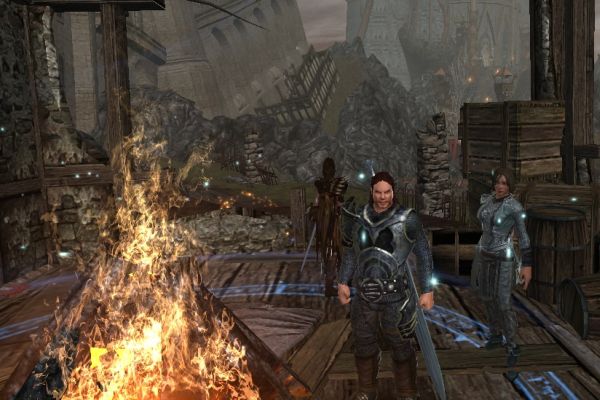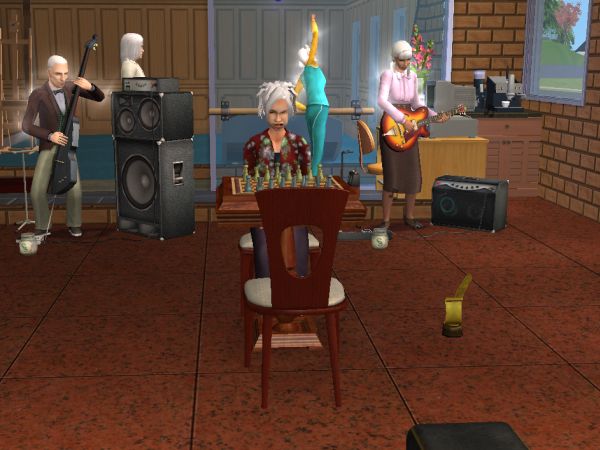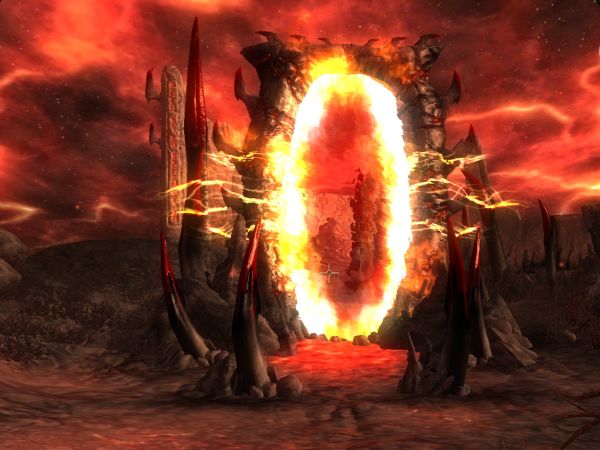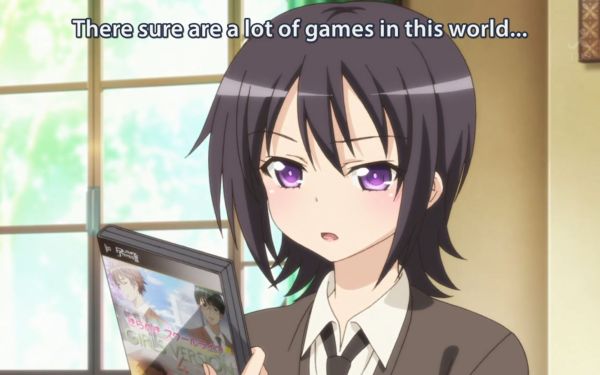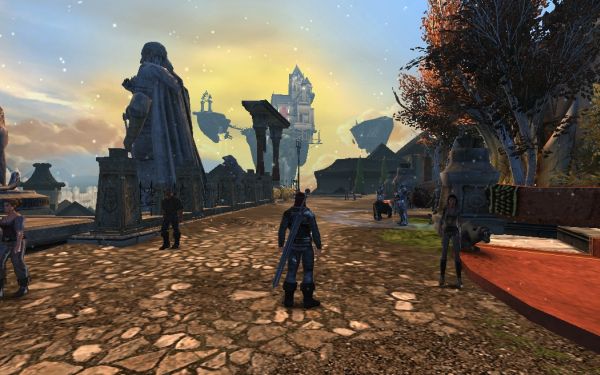
I think this is the prettiest part of the game I have seen so far. Not much to write home about, but reasonably well rendered … just kind of gritty.
The new massive multiplayer online role playing game Neverwinter will be available to the “freeloaders” (free to download, free to play) on April 30, but I am already in. The reason is that I bought a second-tier “founder’s pack”.
In a perfect world, games would be free, and this is as close as you are likely to get. What I mean by that cryptic statement is that you can play the whole game, including endgame content, without paying a dime (if you have a computer and internet access, at least). But obviously someone is paying. In this case, I am one of them. Paying customers get some goodies in the game which makes it a little easier and more colorful. And some of us paid in advance, helping to foot the bill of getting the game to the market. As a thank-you, we got in on the game a little earlier.
Neverwinter is a medieval-style sword and sorcery game, unlike the two other games I have played from Cryptic Studios, the superhero games Champions Online and my favorite MMO ever, City of Heroes. Like other medieval games, Neverwinter tends to have the players all look pretty much alike at the start, except for variations from race, sex and class. I haven’t seen the high-level areas, but so far it looks like people continue to look pretty much the same, the weapons and armor found by questing aren’t all that different looking. The style is on the gritty side, and people are not particularly good-looking. The women all have well developed breasts though, although the armor can reduce the visual impact in some cases, thankfully. I suppose prioritizing breasts over beauty is a hint as to who they expect to be their typical customers.
Despite this initial impression, I have to say the game is surprisingly good. The game mechanics and lore are based on the original Dungeons & Dragons role-playing system, the first in the world of its kind, and a mainstay of paper, pencil and dice role playing for many years. I actually had some source books and stuff for this myself, many years ago, shortly before the Internet came to Norway. It is still viable.
The saving throw, to keep to the terminology, is the wide range of lore accumulated over the pen and paper years. There are innumerable books set in the same game world and at time in the same city, and the copyright holders are actively consulted in making the game. This makes for an immersive, integrated world where all the threads come together. And then there is my excuse for supporting the game in the first place: The Foundry.
The Foundry is a set of developer tools given to users to make their own quests. These quests are then made available in much the same way as the quests created by the developers themselves. Users vote for the quests, and can also flag them for inspection if they contain illegal or indecent content. A similar system existed in City of Heroes, but it is actually even better integrated in this game. You can play only Foundry missions for as long as you like, and get the same kind of half-randomized encounters and loot that you will get in the native quests. In theory you should be able to play all the way to level 60 this way, and some people will probably do.
Unfortunately for their hope of trapping me in their game, the interface is very mouse-heavy. The two main attacks for every class are bound to the left and right mouse button, and you also use to mouse to choose the direction you look and move. As a result, I can only play a fairly short time before my right arm starts hurting again. It has never completely recovered from the repetitive stress injury some years ago, and probably never will, barring divine intervention or nanotechnology.
But on the other hand, as it were, there is crafting and leadership. These skills can be performed through a web interface, including on my smartphone. You can also use the web portal to check your inventory or access the auction house, and guild members can also use it for guild activities, whatever those may bet. This can be done in a rather low-stress manner, including tapping on my smartphone screen, which avoids the cramping from constantly having to hold on to the mouse.
The leadership skill is lumped together with crafting. You assemble a virtual team of mercenaries which you assign to various tasks, like guarding a caravan or exploring the terrain. Each task has a set duration and gives a certain outcome: Leadership XP, pretty much always. Sometimes also character XP, and/or coins, astral diamonds, maps or chests of random goodies. The goodie chests, coins and diamonds go into your inventory. You can actually level up by using XP from your little mercenary team, but if you have the opportunity, you can level up much faster by praying as well.
Oh yes. There are various small gods in the game, and Invocation (available at level 11) let you get various goodies from them once an hour. There is no set praying hour, the 1 hour limit is just a minimum. You need to find an altar or campfire, but these are pretty common (and there are portable altars to be found as well). Sometimes you get just a combat buff (which expires after you’ve been online a certain amount of time), other times special coins, astral diamonds (used for various special shopping) and even a decent amount of XP. So in theory again, you could level up and become rich simply by praying. I am sure some Americans find this appealing. I find it amusing.
So basically there are numerous ways to level up your character and get stuff without playing through the main quests at all. You can pray, you can craft or send your imaginary mercenaries around, or if you deign to fight, you can do so using player-made content only (including your own).
On the off chance that you go fighting, you will have a pet to assist you from the start if you are a Founder like me. Otherwise you gain a companion at level 16, which can be of any class of your choosing. Again, you may have your companion do most of the fighting, but in that case they will level up and you not so much. (You still get the XP for finishing the quest, at least.)
I could see myself spending months trying these fringe activities, just because I can. But preferably those that don’t require frantic mousing. No matter how powerful I become in a 2-dimensional world, it is not worth destroying my body in the 3-dimensional world. And my soul probably won’t thrive on enormous amounts of this, either. It’s not really something I think I will miss having dedicated my life to, when that life is over. Your life may vary.
But a quite well-crafted game it is, so if you’re planning to play a lot of MMORPG, this is well worth a try for free.
